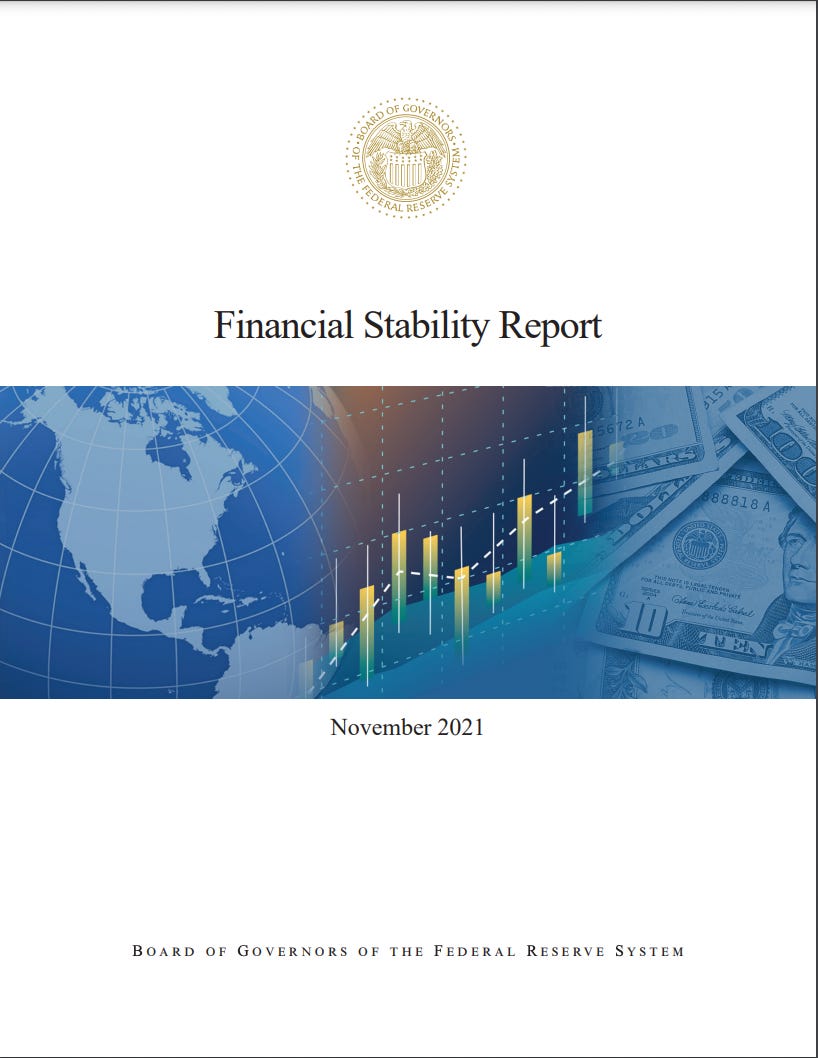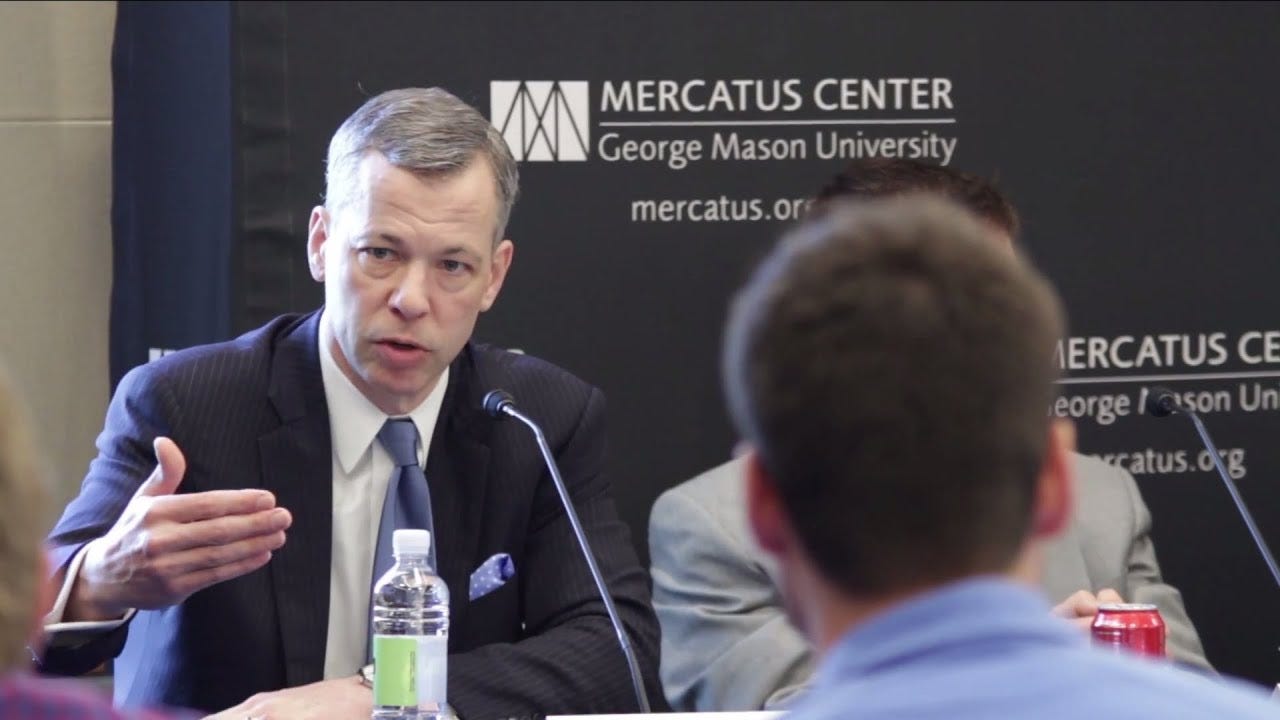Briefing: The most important climate finance agency you've never heard of*
A Trump appointee who slashed the Office of Financial Research remains an crucial actor in shaping climate financial policy
Shortly after the election of President Joe Biden just over one year ago, financial regulators in the U.S. began to catch up with their international peers in acknowledging climate change as a financial stability risk. In a report conspicuously released mere days after Biden clinched the election, the Federal Reserve acknowledged climate change as a financial stability threat for the first time.

A few weeks later, the Fed announced that it would join an international consortium of central banks created years earlier called the Network for Greening the Financial System, and then announced the formation of a “Supervision Climate Committee.”
But in the waning days of the Trump administration, an obscure executive branch agency called the Office of Financial Research (OFR) seemed to push back against this progress. Through the Dodd-Frank Act, Congress created the OFR within the Department of Treasury to assist with the federal government’s work protecting financial stability by collecting data and developing new measurement tools. In its annual report released in November 2020, the OFR included language downplaying the financial stability risks of climate change and questioning the science:
“The potential costs and economic consequences of climate change issues remain a subject of debate among researchers.... One scientist provided this very long-term perspective on natural disasters: ‘The earth has suffered mass volcanic explosions, flooding, meteor impacts, mountain building and all manner of abuses greater than anything people could inflict, and it’s still here … the earth doesn’t care.’ Another suggestion is that increased economic costs of natural disasters also reflect ‘people … flocking to disaster prone regions.’ California seems a good example.”
OFR’s conclusion—citing a not-a-climate-scientist’s 2010 column on a right-wing website—was squarely at odds with climate science, which has affirmatively concluded that human pollution is entirely responsible for the current rapid global warming and that manmade climate change is causing more frequent and intense extreme weather, regardless of population shifts.
The report’s problematic language seemed an indication that the OFR would remain influenced by its leader, Dino Falaschetti, who was installed by President Trump to direct the OFR in 2019. Prior to his Senate confirmation as OFR director, Falaschetti was the Chief Economist for the House Committee on Financial Services during Rep. Jeb Hensarling’s (R-Texas) tenure as Chair. Falaschetti also served as a Senior Economist for the White House Council of Economic Advisers during George W. Bush’s presidency, and was previously Director of Outreach for Financial and Economic Policy at George Mason University’s Mercatus Center, founded by the Koch brothers and Koch executive Rich Fink.
After assuming the role of OFR director, Falaschetti set about executing on the wishes of the Trump administration and of his former boss Hensarling by systematically gutting the office he was now tasked with leading.
As documented in American University Law Professor Hilary Allen’s paper on the need to “resurrect” OFR, the OFR was conceived as one response to the observation that “the Federal Government and the regulatory communities lack the data and lack the research capability to effectively monitor and regulate systemic risk.” Members of Congress originally intended for the OFR to be independent from the Treasury Department, both in terms of funding and staffing, but this didn’t ultimately end up being the way the office was designed.
Congressional Republicans were hostile to OFR from the beginning, and Hensarling characterized OFR as “Big Brother.” Despite this hostility, by the end of the Obama administration, the OFR had grown into a staff of over 200 with an annual budget of nearly $93 million, and was serving its intended function of developing new financial stability measures such as the Financial System Vulnerabilities Monitor.
Under Trump and Falaschetti, the OFR did away with these tools, and its staff was reduced to 96 people with a budget of $76 million. The Trump administration framed budget cuts to OFR as signs of “fiscal discipline,” even though OFR’s budget does not rely on public money, but is instead determined by fees collected from the financial industry.
Trump successfully weakened OFR’s institutional capacity to serve as a non-voting member of the Financial Stability Oversight Council (FSOC) and advise on financial stability risks including climate change. This seemed to be underscored during Treasury Secretary Janet Yellen’s first convening of FSOC as Chair. When Yellen asked each FSOC member, voting and non-voting, to provide an update on what their agency was doing about climate change, Falaschetti was the only member not to speak.
It was a worrying sign therefore when President Biden’s May 2021 executive order instructing Yellen and the FSOC to prepare a report on climate-related financial risk also gave the OFR an official role in preparing the assessment. In July, a group of climate and financial reform organizations signed a letter urging Biden to replace Falaschetti with a new director, citing the need for “an effective OFR with a capable leader to understand the systemic risks posed by climate change” as one reason why.
Reinvigorating the OFR must be a cornerstone of rebuilding the capacities of federal financial regulators and their ability to detect and respond to emerging threats. These threats will not abate. Instead, the incoming waves farther out at sea loom larger. Recovering from the pandemic and ensuring greater resiliency is but one wave. Preventing another 2008 financial crisis is another. The systemic risks from climate change represent a wave that could dwarf these others. We need an effective OFR with a capable leader to understand the systemic risks posed by climate change.
At least for the moment, however, Falaschetti remains in charge of OFR. OFR recently released its annual report to Congress, and thankfully, the climate change denial language from 2020’s report was absent. OFR’s report gives a strong sense of the mounting losses from climate disasters, observing that winter 2021 saw “the highest level of first-quarter insured catastrophe losses on record despite historical records showing the first quarter to be a light catastrophe loss quarter;” and warning that “[m]ore frequent and severe storms, droughts, floods, and wildfires, among other physical risks, could mean more damage to property and more supply chain disruptions.”
While providing an accurate overview of the physical and transition risks that climate change poses, the report also describes a category known as “liability risk,” which warns of losses from “climate-related litigation compensation for environmental damage, bodily harm, and failures to disclose risks or policy changes that cause economic or financial harm to particular firms and individuals.”
Even as the report highlights important financial stability risks from climate change, it places special emphasis on how climate’s “potential risk to the financial system is still difficult to identify, assess, and forecast.” The report’s numerous assertions to this end must be understood alongside an important line in the FSOC’s October report, which noted that “the need for better data and tools cannot justify inaction, as climate-related financial risks will become more acute if not addressed promptly.”
As the regulators who participate in the FSOC heed the report’s recommendation to act even in the face of imperfect data and tools, the OFR can be a tremendous resource in filling gaps in data and tools. That was OFR’s entire purpose when it was created after the 2008 financial crisis. Yellen must ask whether that objective is better met by someone who has systematically undermined the office and doesn’t seem to take climate change seriously, or by a new director.




